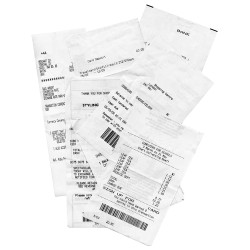Top Class Actions’s website and social media posts use affiliate links. If you make a purchase using such links, we may receive a commission, but it will not result in any additional charges to you. Please review our Affiliate Link Disclosure for more information.

Companies that do not follow these credit card receipt laws may be putting you and your personal information in danger, and if reported, may be subject to penalties.
These credit card receipt laws fall under FACTA, the Fair and Accurate Credit Transactions Act, which was passed back in 2003 and has been fully active since 2006.
FACTA credit card receipt laws are intended to keep you and your information safe from potential fraud and identity theft.
FACTA Basics
Simply knowing what these credit card receipt regulations require can help you to spot FACTA violations immediately. This will help keep your information and identity safe, as well as those of other customers.
FACTA allows only certain credit card receipt information to be openly displayed. Specifically, FACTA requires that only the last five digits of a card number can be shown. No more than five digits can be shown, and digits from elsewhere in the number must be censored.
This is known as credit card receipt truncation and is the most important part of FACTA. Truncation must be done in a very precise manner to properly comply with all FACTA regulations.
It should be noted that these rules only apply to electronic receipts. Hand-written receipts are exempt from these rules. However, the vast majority of receipts have been printed electronically for years.
To make sure electronically printed credit card receipts comply properly with FACTA regulations, businesses simply need to make sure their machines are set according to those rules.
FACTA rules also require that no part of a card’s expiration be shown.
Each FACTA credit card receipt violation can also result in penalties against the company, which may lead to financial compensation.
Credit Card Receipt Lawsuits
Consumers who have noticed FACTA violations on their credit card receipts should report these issues and file a credit card receipt lawsuit.
FACTA litigation has previously led to substantial payments for those who have been affected by FACTA violations. FACTA may award statutory damages of up to $1,000 per violation, regardless of whether or not that violation led to identity theft.
Electronically printed credit card receipts with FACTA violations most often do not only affect a single consumer. Because the receipts are electronic, the issue lies with improperly programmed machines.
For large businesses, this can extend to thousands of receipts printed with information that violates FACTA rules.
When filing a FACTA credit card receipt lawsuit, you will need proof of FACTA violations. Fortunately, it is simple enough to provide the necessary proof. Simply retain any receipts that you believe may have violated FACTA regulations.
Make it a habit to check your credit card receipts for FACTA compliance. This will not only protect your information, but also help to protect the information of others as well.
Free FACTA Class Action Lawsuit Investigation
If you made one or more purchases and the retailer provided you with a receipt that contained more than the last five digits of your credit or debit card number or the expiration date, you may be eligible for a free class action lawsuit investigation and to pursue compensation for these FACTA violations.
ATTORNEY ADVERTISING
Top Class Actions is a Proud Member of the American Bar Association
LEGAL INFORMATION IS NOT LEGAL ADVICE
Top Class Actions Legal Statement
©2008 – 2024 Top Class Actions® LLC
Various Trademarks held by their respective owners
This website is not intended for viewing or usage by European Union citizens.














